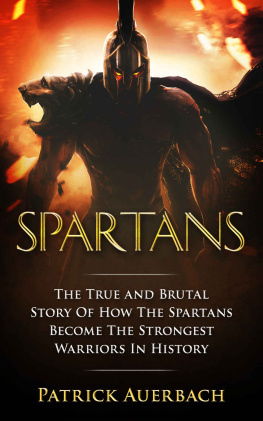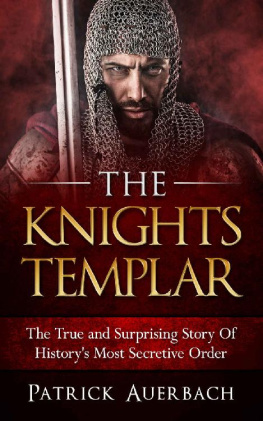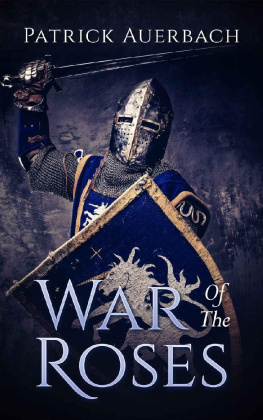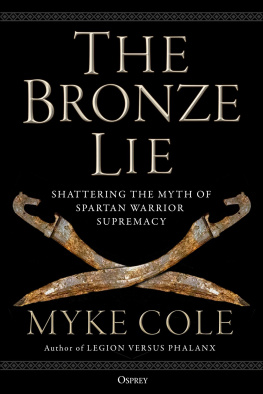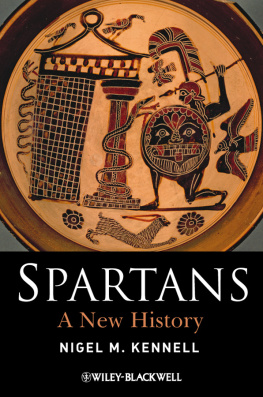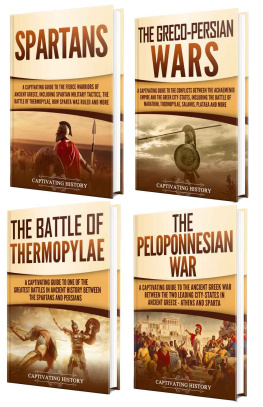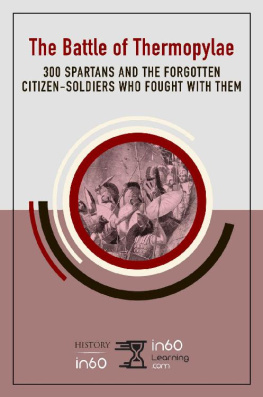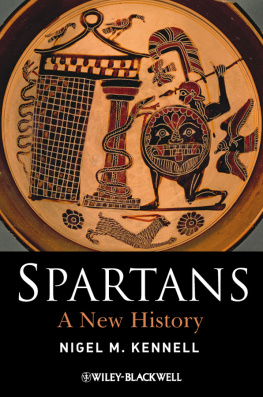The True and Brutal Story of How the Spartans Become the Strongest Warriors in History
Introduction
I want to thank you and congratulate you for downloading the book , Spartans: The True and Brutal Story of How the Spartans Become the Strongest Warriors in Histor y .
"The Spartans used to ask about the enemy, it was not important how many there are, but where the enemy was (Plutarch, Moralia ).
This book contains specific evidence of the steps and strategies on how to live, train, and fight like the Spartans on the battlefield. In addition, this book provides an in-depth examination of the daily lives of the Spartan people in terms of their rituals, gender roles, courtship traditions, as well as some of their leisure activities including javelin tosses. Not only will you be able to learn how to battle like a Spartan, but you may also learn to adopt the simplistic Spartan way of life. Finally, as you progress through the chapters of this book, you will learn the details of some of the most famous battles in Greece fought by the Spartans which led to their rise and fall in terms of authoritative power. Most interestingly is that, through reading this book, you may find some similarities between the political and social actions of the Spartans and the modern-day western views and traditions relating to government. So, strap your feet into your sandals, throw on your finest bronze armor, raise your swords to the sky, and let out your best battle cries as you begin this guided journey through the city-state of Sparta from the prehistoric and Middle Neolithic periods to the classical Sparta period beginning around 480 B.C. as well as the Hellenistic and Roman Sparta periods beginning around 371 B.C. and 146 B.C.
Thanks again for downloading this book, I hope you enjoy it!
Copyright Information
Copyright 2014 by From Hero To Zero - All rights reserved.
This document is geared towards providing exact and reliable information in regards to the topic and issue covered. The publication is sold with the idea that the publisher is not required to render accounting, officially permitted, or otherwise, qualified services. If advice is necessary, legal or professional, a practiced individual in the profession should be ordered.
- From a Declaration of Principles which was accepted and approved equally by a Committee of the American Bar Association and a Committee of Publishers and Associations.
In no way is it legal to reproduce, duplicate, or transmit any part of this document in either electronic means or in printed format. Recording of this publication is strictly prohibited and any storage of this document is not allowed unless with written permission from the publisher. All rights reserved.
The information provided herein is stated to be truthful and consistent, in that any liability, in terms of inattention or otherwise, by any usage or abuse of any policies, processes, or directions contained within is the solitary and utter responsibility of the recipient reader. Under no circumstances will any legal responsibility or blame be held against the publisher for any reparation, damages, or monetary loss due to the information herein, either directly or indirectly.
Respective authors own all copyrights not held by the publisher.
The information herein is offered for informational purposes solely, and is universal as so. The presentation of the information is without contract or any type of guarantee assurance.
The trademarks that are used are without any consent, and the publication of the trademark is without permission or backing by the trademark owner. All trademarks and brands within this book are for clarifying purposes only and are the owned by the owners themselves, not affiliated with this document.
Chapter 1: The Daily Life of the Spartans
A Brief History of the Spartans
This is Sparta! ( , 2006 ). Many have quoted this famous line of dialogue from the 2006 blockbuster hit . In fact, over the years, there have been several films based on the history of Sparta. But what exactly was Sparta and who were the Spartans? Sparta was a society located the region of Laconia in ancient Greece that rose to its highest power between 431 and 401 B.C. The people who inhabited to society of Spartathe Spartanswere a highly loyal militant group, the men receiving intense training for battle when they were only boys and the women, unlike most Greek women at the time, were trained to become intellectual members of society.
From the Prehistoric Period to the Archaic Period
Although the literary evidence regarding events during the prehistoric period of the Spartans is not completely clear, the earliest sound evidence of humans settling within the vicinity of Sparta comes from pottery dating back to the Middle Neolithic period (also known as the New Stone Age), found just 1.2 miles southwest of Sparta. Such artifacts are the oldest pieces of evidence of the Mycenaean Spartans, settlers during the final phase of the Bronze Age in Greece, which were reflected in Homers Iliad . By the end of the Bronze Age, the civilization began to fall due to Macedonian tribes invading Peloponnese, where they were referred to as Dorians. The Dorians made plans to settle and start a new frontier in Spartan territory, battling the Argive Dorians east and southeast of Sparta as well as the Arcadian Archaeans northwest of Sparta. To date, there has not been any distinct archaeological evidence of the Dorians or the Dorian Spartan civilization along the Eurotas River Valley, where the city of Sparta is located.
The Dark Age of Spartan history is believed to be legendary in that it deals with the Greek mythology, including heroes such as the Heraclids and the Perseids, combining both fictional events and possible historical ones. It is this period of Sparta that provides the first believable sources of Spartan history. From an archaeological standpoint, it is presumed that the first Spartan settlement began around 1000 B.C., two hundred years after the fall of the Mycenaean civilization. It is possible that Spartas dual kingship government originated from a combining of two Spartan villages during this time period.
Classical Sparta
The Spartans faced a stretch of anarchy and civil conflict during the 7 th and 8 th centuries B.C. and because of this, a number of political and social policy changes were carried out which the Spartans later linked to the mythological lawmaker, Lycurgus. These changes in Spartan society are used as a starting point for the Classical Sparta period of civilization. During the Second Messenian War, Sparta was established as a local authority in Peloponnese and the remainder of ancient Greece. In the centuries to follow, the Spartans original reputation as a land-fighting people was incomparable to other civilizations in Greece. It is during the Classical Sparta age that the Spartans took part in the famous battles of Thermopylae and the battle of Plataea.
In the latter part of Classical Sparta, Sparta along with Athens, Thebes, and Persia had been the main states battling for dominance over each other in the Peloponnesian War. As an outcome of this war, Sparta became seafaring warriors. Classical Sparta saw the threshold of Spartan power over even the most elite Athenian naval force. As Classical Sparta approached the 5 th century B.C., Sparta caught the eyes of many as a society of people who defeated the Athenians overtook Persian territories in Anatolia, marking the period of Spartas greatest military on land called the Spartan Hegemony.
In the Corinthian War that followed, Sparta was faced with an alliance of the most powerful states in ancient Greece: Thebes, Athens, Corinth, and Argos. This four-way partnership was originally supported by Persia, which had previously been invaded by Sparta in territories within Anatolia and Persians were concerned that the Spartans would expand their invasion further into Asia. Although the Spartans were victorious on land, they did not fare as well on sea as many of their battleships were obliterated during the battle of Cnidus in which Persia provided Athens with a mercenary fleet of Greek-Phoenician warriors. Due to this defeat, Spartas naval power was severely impaired but the Spartans did not give up their ambitions of invading more territories in Persia until the Athenian general Conon tore apart the Spartan coastline and instilled fear in the Spartans of a rebellion by the helots, state-owned slaves in Sparta.

